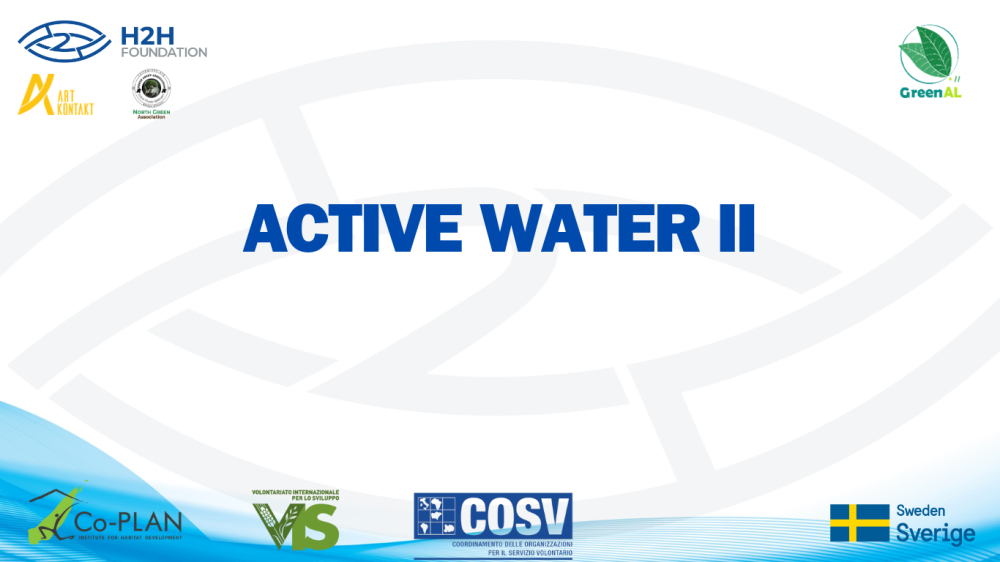“Active Water II” is implemented by H2H Foundation in collaboration with Art Kontakt and North Green Association , within the framework of the project GreenAL “Support to Civil Society Organizations 2024 -2027″, financed by the Swedish International Development Cooperation Agency (SIDA ) with funds from the Swedish Government and implemented by Co-PLAN , Institute for Habitat Development in collaboration with VIS Albania and COSV – Cooperazione per lo Sviluppo.
Note: For more information about each organisation, click on the respective names highlighted with blue to visit their website.
Location: Tirana, Durres, Elbasan, Fier, Belsh, Shkoder and Pustec.
Status: Ongoing
The overall objective is to increase the efficiency and effectiveness of water resources management for sustainable use by creating a collaborative table that will facilitate inter-institutional coordination to address water quality concerns. Based on data from field monitoring to inform both policies and practices for water quality management.
Specific Objectives:
- Improve access to information and technology and ensure that all stakeholders have equal access to information and technology, improving their capacities to manage water quality.
- Creating a strong network of cooperation between civil society organizations, local authorities and communities will help improve water resource management.
- Increasing community engagement and awareness and expanding the involvement of marginalized groups, especially women, in water quality issues, promoting equity and social inclusion.
Project description:
Water is one of the main global challenges and is considered the most important social and economic risk for the future. It is the key to life and essential for social development. Albania possesses abundant water resources. There are six main river basins (Drin, Mat, Ishem – Erzen, Shkumbin, Seman and Vjose), which emerge from the borders of neighbouring countries and cross Albania and there are also three major transboundary lakes, Ohrid, Shkodër, Prespa and 247 other small lakes that occupy about 4% of the total area of the country as well as over 600 water reservoirs which are used for irrigation, hydroelectric power and recreation. Lakes, reservoirs but also drainage canals and rivers are important sources not only for irrigation but also as tourist attractions. Irrigation is a key element that helps increase agricultural production and supply fresh produce not only to local communities but also to tourists and, in recent years, for export to several European Union countries.
These waters have a special role in tourism and recreation that is expanding beyond the Albanian Riviera, offering opportunities for activities not only such as swimming but also other water sports or sport fishing.
Water resources are sensitive to pollution, as are the organisms that live in or from them. Particularly in areas with high population density, both by residents and tourists, the impact of water quality on human well-being can be both helpful and detrimental. The ecological systems of these resources are sensitive and responsive to climate change and human interventions, making them key indicators of ecological change. Albania has faced a significant decline in water quality, especially in surface waters, due to various sources of pollution.
Climate change has affected the quantity and quality of water, causing droughts and floods that affect water resources. Erosion, mainly caused by inadequate land cover and poor resource management, exacerbated by deforestation, abandoned agricultural lands and overgrazing, contributes significantly to water pollution.
Regular monitoring and analysis of water quality data, such as pH, turbidity, and chemical and bacteriological contaminants, as well as the assessment of ecological and health impacts, are vital to understanding environmental impacts and implementing sustainable management strategies. This is important to protect aquatic habitat and ensure clean water for future generations. The water quality monitoring network plays a critical role in this process, providing valuable data that helps to make informed decisions about the management of the aquatic environment.
In Albania, surface water monitoring is part of the National Environmental Monitoring Program, which is implemented by the Ministry of Environment and other relevant institutions. This program aims to assess the state of waters and identify sources of pollution in order to take appropriate measures for environmental protection.
The expected results include improved water quality management through identification and addressing of key issues, as well as collection of accurate data on the condition of water bodies. Regular monitoring and assessment of progress will enable the adaptation of strategies and policies for more effective management. Detailed reports will serve as a basis for informed decision-making and further actions. Also, increased public awareness and cooperation between stakeholders will strengthen the commitment to the conservation of water resources and sustainable development.
The main activities that will be carried out within the project are:
- Stakeholder engagement: Meetings with municipalities, agriculture, water departments and ministries to present the project and collect information on critical water bodies. Organization of local, regional and national dialogue, as well as awareness campaigns with stakeholders and NGOs on surface water monitoring.
- Water quality monitoring: Selection of water bodies for monitoring and implementation of a plan for sampling and analysis.
- Environmental Component Assessment: Assessment of the impact of identified pollutants on the ecosystem and human health.
- Promoting best practices: Development and dissemination of guidelines for water quality management.
- Advocacy and Community Engagement: Seminars and conferences to share findings, as well as awareness campaigns and educational programs for community involvement in water resources management.

